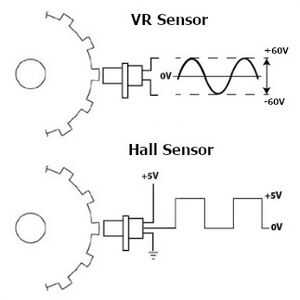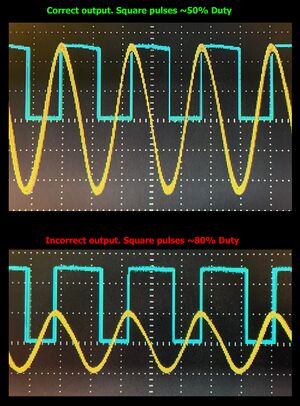Tech Details and Explanation
Honda B, D, F and H series engine distributors have three Variable Reluctance Sensors: CKP, TDC, and CYP. The voltage at these sensors varies with engine speed in the range of ±5V to ±60V.
VR Sensors are critical for the ECU to maintain proper engine angle tracking. Unlike modern Hall sensors, which provide a digital output, VR Sensors provide an analog signal whose amplitude varies with engine speed (see Fig. 1). This variability can lead to signal integrity problems at high RPM, where precision is critical to efficient engine performance.

To process these high voltage signals and convert them into a digital output, a daughter board is installed in the Honda ECU, also known as the VR Conditioner (see Fig. 2). A distinctive feature of this VR Conditioner is the adaptive reduction in sensitivity to the input voltage of the VR Sensors as the engine speed increases.
This setup is good for working with VR Sensors, but creates a serious problem when emulating OEM distributor signals. Ignition accuracy and correctness are very sensitive to the input voltage to the ECU. If the voltage at the current speed is not correct, the ignition timing begins to shift or misfire.
The oscilloscope reading shows what happens to the output signal at 8000 RPM (see Fig. 3). The blue trace shows the output of the VR Conditioner, and the yellow trace shows the input of the VR Sensor. The correct output signal always has a load of ~50%. If the input voltage is incorrect, the load begins to increase and the ignition timing begins to shift or misfire.
To emulate the Distributor, one might consider designing an electronic device that emulates VR Sensors. However, the characteristics of VR Sensors and the necessity of double signal converting from digital to high voltage and back can seriously affect the accuracy of ignition timing at high speeds. Additionally, high voltage emulation would not be compatible with Standalone ECUs without additional signal converters.
After a detailed researching of the VR Conditioner's operation, we found simpler way to solve these problems (Patent pending). It's proposed "lock" sensitivity of VR Conditioner, which will allow the ECU to consistently work with low voltage signals.
Applying this simple modification allow us to generate stable trigger patterns up to 14000 RPM with 0.1 degree Ignition tolerance.
Modification Guides
Most Popular ECU Guides
- Chipped OBD1: Denshigiken M66207 ECU Guide
- Chipped OBD1: OKI M66207 ECU Guide
Search Guide by Car Model
90-93 Honda Accord 4.
- 90-93 Models: Denshigiken M66911 ECU Guide
93-97 Honda Accord 5. USA Spec.
- 93-95 Models: Denshigiken M66911 ECU Guide
- 96-97 Models: Denshigiken M66509 ECU Guide
93-97 Honda Accord 5. EUR Spec.
- 93-97 Models: Denshigiken M66911 ECU Guide
98-02 Honda Accord 6. USA Spec.
- 98-02 Models: Keihin M66589 ECU Guide
98-02 Honda Accord 6. EURO Spec.
- 98-02 Models: OKI M66589 ECU Guide (Regular O2)
- 98-02 Models: OKI SH7000 ECU Guide (Semi Wideband O2)
92-95 Honda Civic 5
- 92-95 Models: Denshigiken M66207 ECU Guide
94-01 Honda Civic 5.5. UK Spec.
- 94-97 Models: OKI M66207 ECU Guide
- 97-01 Models: OKI M66507 ECU Guide
96-00 Honda Civic 6.
- 96-98 Models: Denshigiken M66507 ECU Guide
- 99-00 Models: Keihin M66589 ECU Guide
95-01 Honda CR-V 1.
- 95 Models: Denshigiken D78334 ECU Guide
- 96-98 Models: Denshigiken M66507 ECU Guide
- 99-01 Models: Keihin M66589 ECU Guide
92-98 Honda CR-X DelSol.
- 92-95 Models: Denshigiken M66207 ECU Guide
- 96-98 Models: Denshigiken M66507 ECU Guide
92-97 Honda Domani.
- 92-97 Models: Denshigiken M66207 ECU Guide
89-93 Honda Integra 2.
- 89-91 Models: OBD0 ECUs not supported
- 92-93 Models: Denshigiken M66207 ECU Guide
93-01 Honda Integra 3.
- 93-95 Models: Denshigiken M66207 ECU Guide
- 96-99 Models: Denshigiken M66507 ECU Guide
- 00-01 Models: Keihin M66589 ECU Guide
92-96 Honda Prelude 4.
- 92-96 Models: Denshigiken M66911 ECU Guide
96-01 Honda Prelude 5.
- 96-01 Models: Denshigiken M66509 ECU Guide
95-99 Rover 400 Series. (D16 Engine)
- 95-97 Models: OKI M66207 ECU Guide
- 97-99 Models: OKI M66507 ECU Guide
99-05 Rover 45 Series (D16 Engine)
- 99-05 Models: OKI M66507 ECU Guide
Search Guide by ECU Hardware
OBD1 ECU Families
- Denshigiken M66207 ECU Guide
- OKI M66207 ECU Guide
- OKI M66507 ECU Guide
- Denshigiken M66911 ECU Guide
- Denshigiken D78334 ECU Guide
OBD2A ECU Families
- Denshigiken M66507 ECU Guide
- Denshigiken M66509 ECU Guide
OBD2B ECU Families
- Keihin M66589 ECU Guide
- OKI M66589 ECU Guide
- OKI SH7000 ECU Guide



